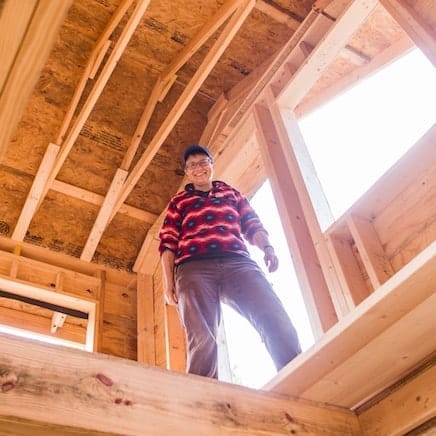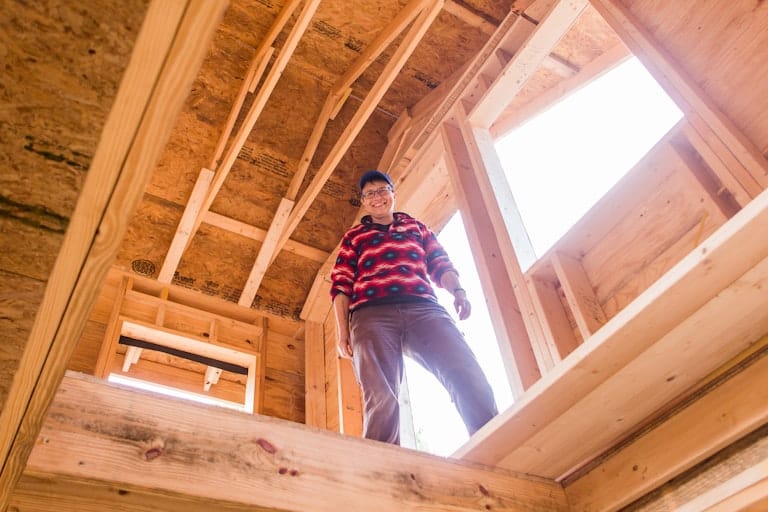On This Page
We welcome you to read through this page for a whole-picture perspective on our 4-Month Carpentry Training Programs. If you’re looking for specific information, you can use the following links to skip around:
Get confident building for yourself and others in our carpentry training program.
Our hands-on carpentry program is non-residential and takes place at Wild Abundance, located near Asheville, NC. It’s appropriate for beginning to intermediate level builders; no experience is necessary, just enthusiasm, a willingness to learn by doing, and the desire to work hard. If you do have some experience, there will be plenty of depth and advanced skills to dive into, you’ll definitely learn a ton too.
This is a non-residential program. Some participants already live in the Asheville area, and many move here specifically to take part. If you live a little too far to commute, but not far enough to move, you are welcome to camp on campus the night before and during program days each week.
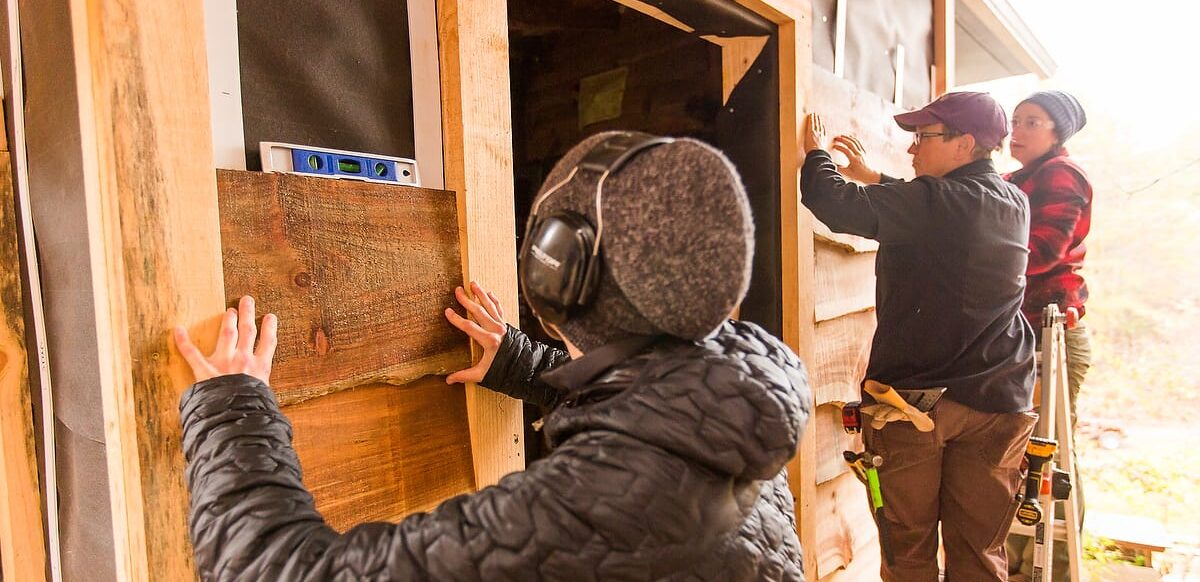
Join a small group carpentry program with lots of personalized guidance and support.
Experience a hands-on carpenter program led by experienced instructors! For two days each week you and your fellow carpentry training program participants will work directly with a mentor on a variety of projects, including building and maintaining structures at our permaculture homestead campuses. At times you will be encouraged to work on your own without the guidance of mentors—this is an important part of your skill-building training and we’ve found our students really thrive!
You’ll also get into things like concrete work, roofing, preparing for building classes, sticker stacking lumber, and more. Together with a small group of other participants, you’ll get clear, hands-on guidance on projects and the practice (not just theory) of how to do them.
In order to make this a more comprehensive carpentry training, we’ve added a 10-day tiny house immersion to the regular 4 month program. During this intensive, you will learn (and actually complete) the framing and sheathing of a tiny house, along with the other content mentioned in our Tiny House Building Course.
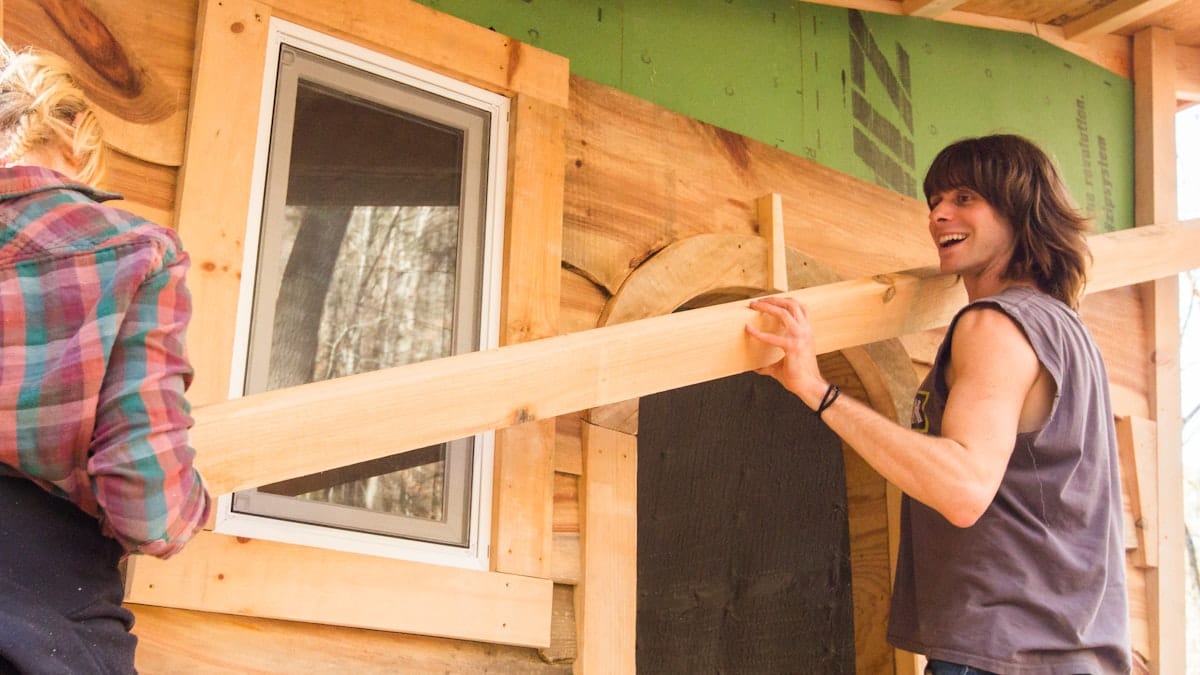
Bonus! You’ll get lifetime access to our comprehensive online building program.
The hands-on carpentry program includes access to our comprehensive Online Tiny House Academy. We’ll give you regular assignments to watch specific video lessons in preparation for, or as follow-up to, the work at hand. This way, you get to learn the concepts intellectually and also put them into action in a flexible online/in-person setting.
What Our Carpentry Training Program Students Say
scroll right to read more

Hayden
Asheville
Composer
“When I came to Wild Abundance, I had no experience with power tools other than a drill. I didn’t even know what an impact driver was. And now I’m using one multiple times a week, plus saws and other power tools. My goal is to eventually build a house and I know this is doable now. The apprenticeship has been a jumping off point for being able to do pretty much whatever I want.”
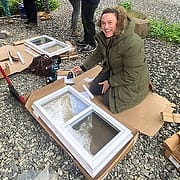
Justine
Asheville
Home Rennovator
“Since my time at Wild Abundance as a carpentry apprentice, my skill level and confidence has increased tenfold, as well as my ability to problem solve and come up with solutions. I am so grateful to have found a woman-led organization in my community where I can learn building skills in an empowering and supportive environment. Don’t think twice—sign up for that class you keep checking out. You won’t regret it!”

Beryl
Vagabond and Traveler
“As a woman, I was really scared to enter spaces like this because I had very little knowledge, but Wild Abundance is so woman-centric and welcoming, I decided I was going to drive across the country and come here. I feel so excited to learn and express myself here.”

Roy
Asheville
SEO Strategist
“I came here to gain confidence and knowledge and the ability to be safe with these things, and I got a lot more than that. I have this sense of autonomous-ness now where I can take an idea in the mental space and turn it into something physical. That’s been really cool to be able to create.. It’s been pretty transformational.”
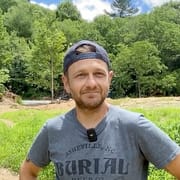
Glen
Swannanoa
“Anybody can do this– you just have to take the time to learn. When we did the tiny home I realized It’s not as hard as you think, once you have the knowledge. I’m going to build a small deck for our backyard and I know I can do it. Wild Abundance is a very supportive place to be. Everybody was so nice and so welcoming and it was just a really good crew to work with.”
Ready to Join?
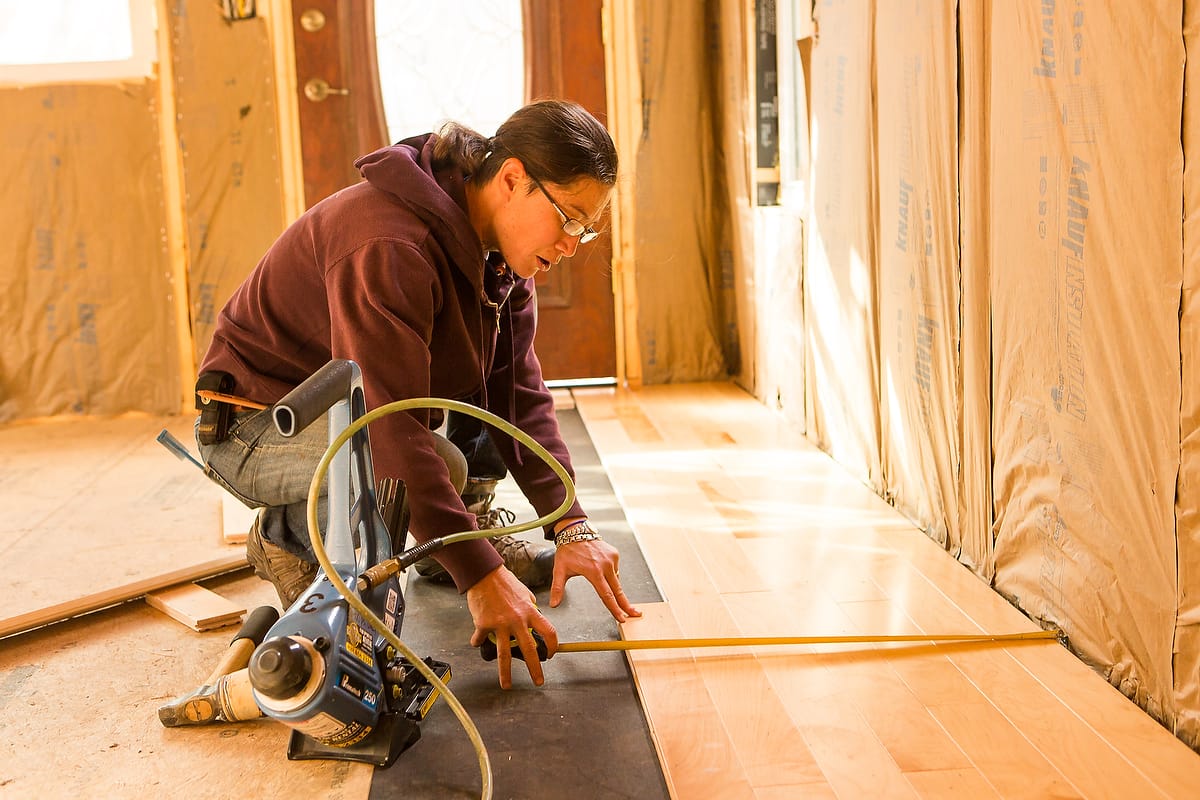
What to Expect: A Four-Month Carpentry Training
This hands-on carpentry program is all about learning by doing; it will grow your skills and confidence.
Expect to devote two days per week to hands-on learning for a variety of projects over a four-month period. You can choose to join us for a spring/summer session from March-July or a summer/fall session from July-November. Features of the carpentry training program include:
Throughout this carpentry training program, we’ll work together on some from-scratch projects, complete existing projects, and maintain some of the structures and systems already in place at our well-established campuses.
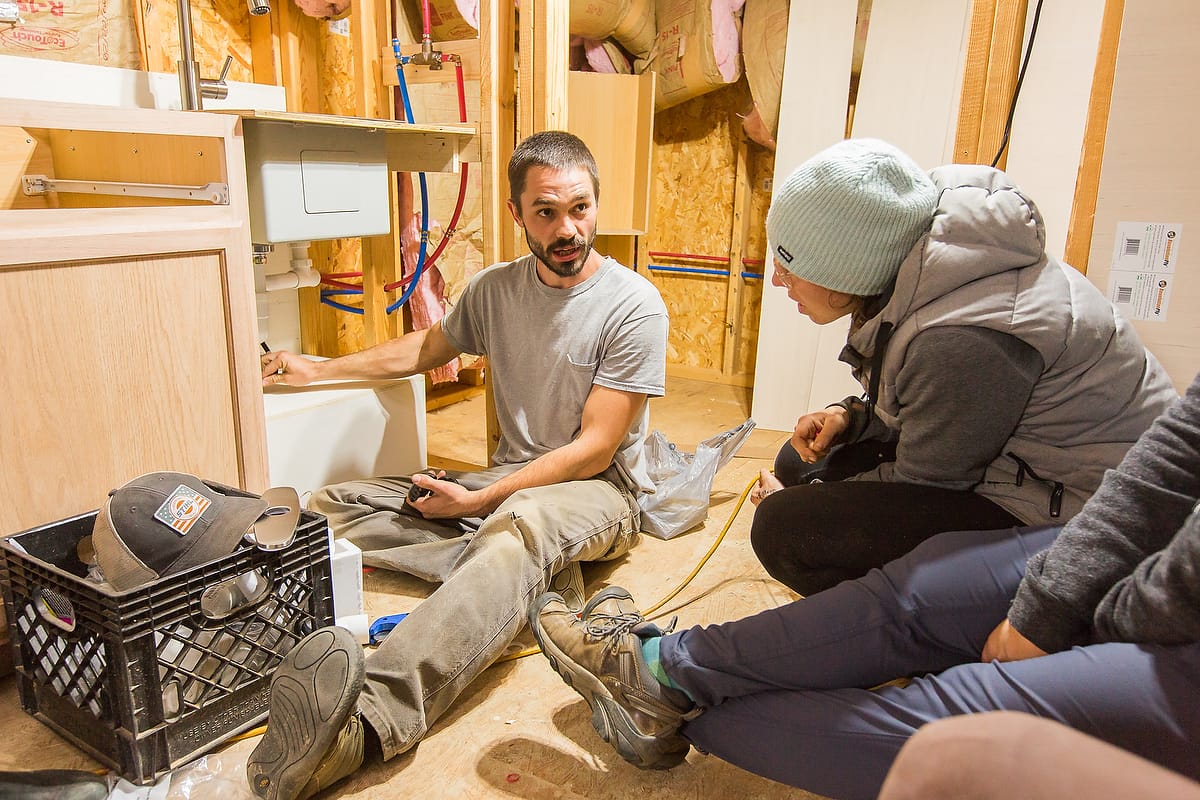
There will be some straight-up class time focused on design and learning specific skills, but the vast majority of your time will be spent learning by doing. Some days you will be working with a mentor on a specific project, and other times you’ll be working with other participants or on your own.
Throughout the carpentry program you’ll get into a wide variety of tasks and skills like: setting up a tarp over a building site; doing site prep; installing hardwood floors; painting; running to the store for supplies; assisting a tile job with a tile expert; etc.
- A 10-day intensive tiny house workshop
- Hands-on experience with both rough and finish carpentry projects
- A perfect environment for enthusiastic beginner and intermediate builders
- Work on a tiny house for Hurricane Helene flood victims
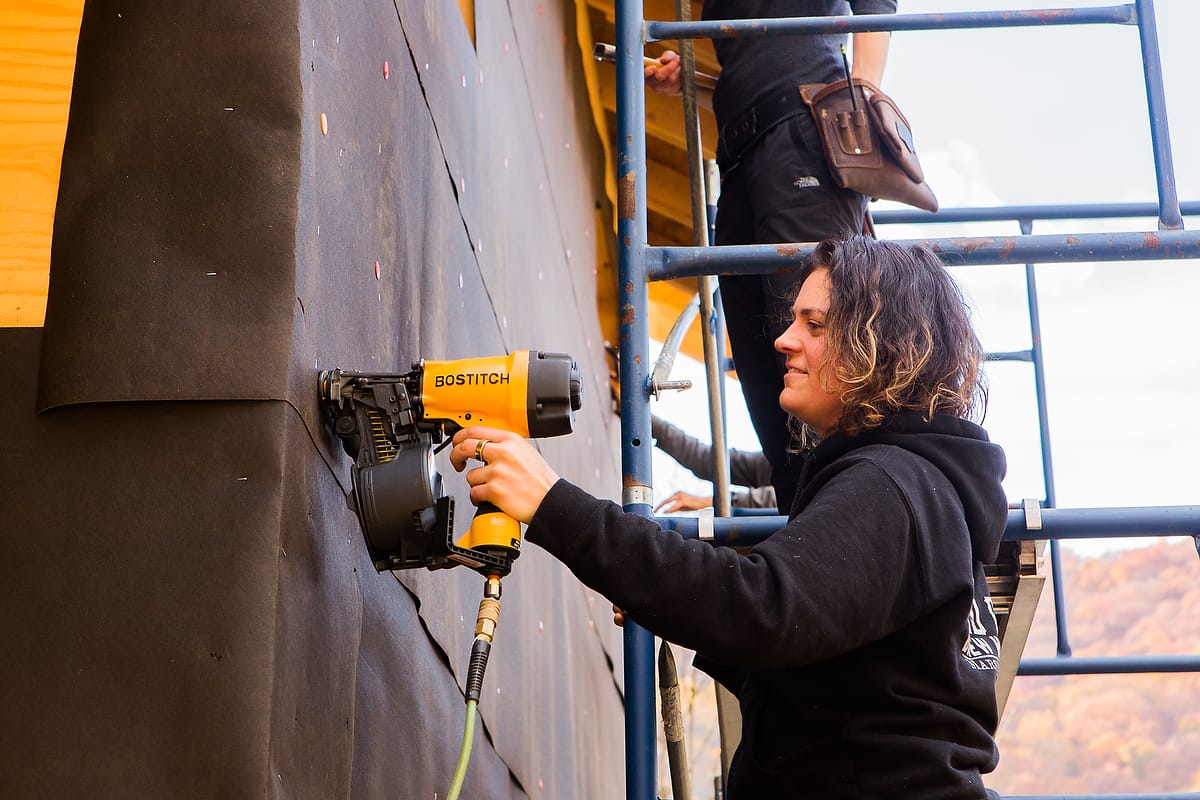
Here are some specific projects you’ll work on:
- Building design
- Floor framing
- Wall framing
- Roof framing
- Window installation
- Electrical
- Metal roof installation
- Concrete work
- Trim
- Layout
- Proper use of carpentry tools
- Lumber stacking and storage
- Preparation for building classes
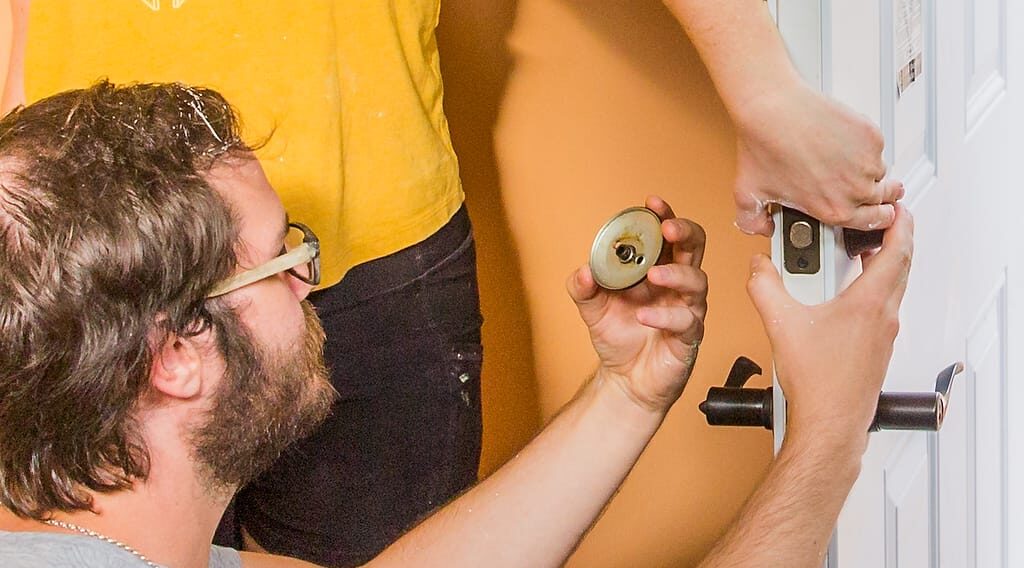
Depending on timing and the progression of projects, you may also get into doing or seeing demos of:
- Siding
- Plumbing
- Insulation
- Tilework
- Door installation
- Interior paneling
- Cabinet installation
- Appliance or fixture installation
- Site preparation
- Lime or other natural plaster
- Moving buildings
- And other skills
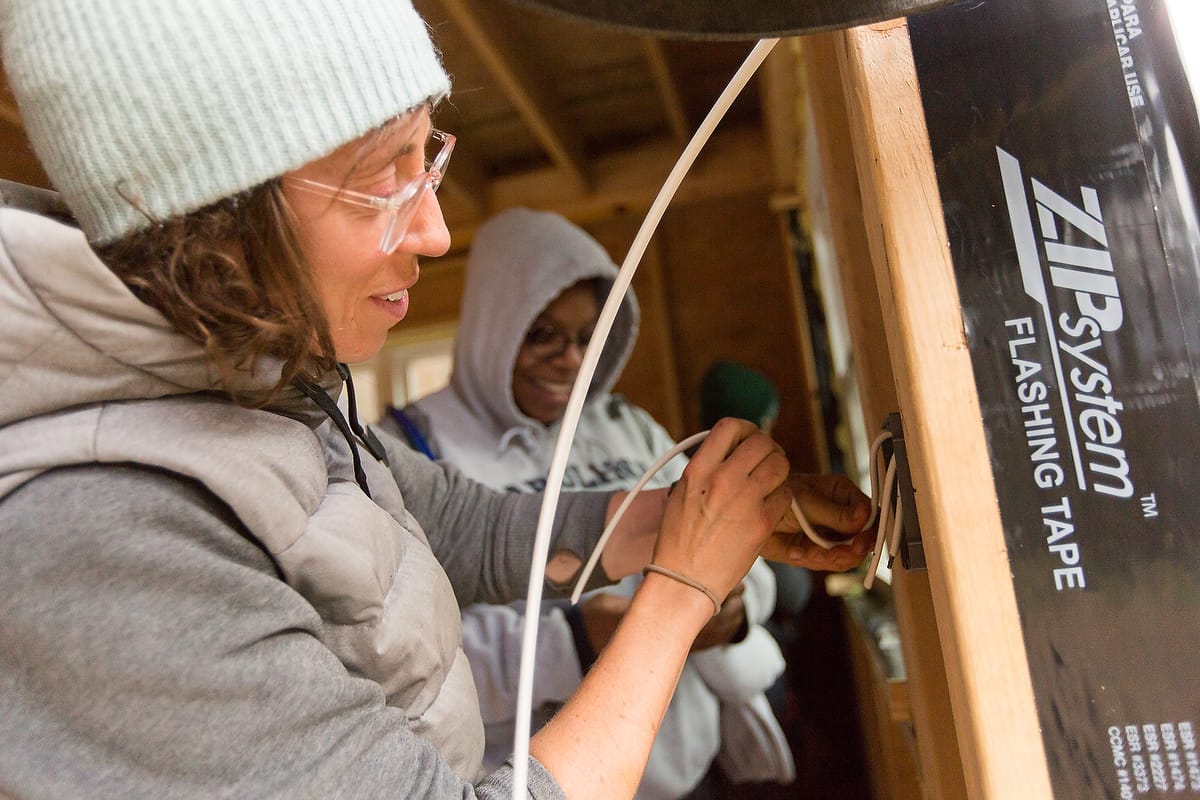
Please note: this hands-on carpentry program includes real work.
Learning by doing means that your body gets into the work of building and carpentry. You’ll be bending, stooping, using tools, carrying heavy loads, climbing ladders, and working in varied weather. Some of this work will be glamorous, and a lot of it won’t be. Nobody will be pushed beyond their own physical abilities, but everyone will be expected to work hard. We like to get to know each other and have a lot of fun together, and we also need to make real progress on projects.
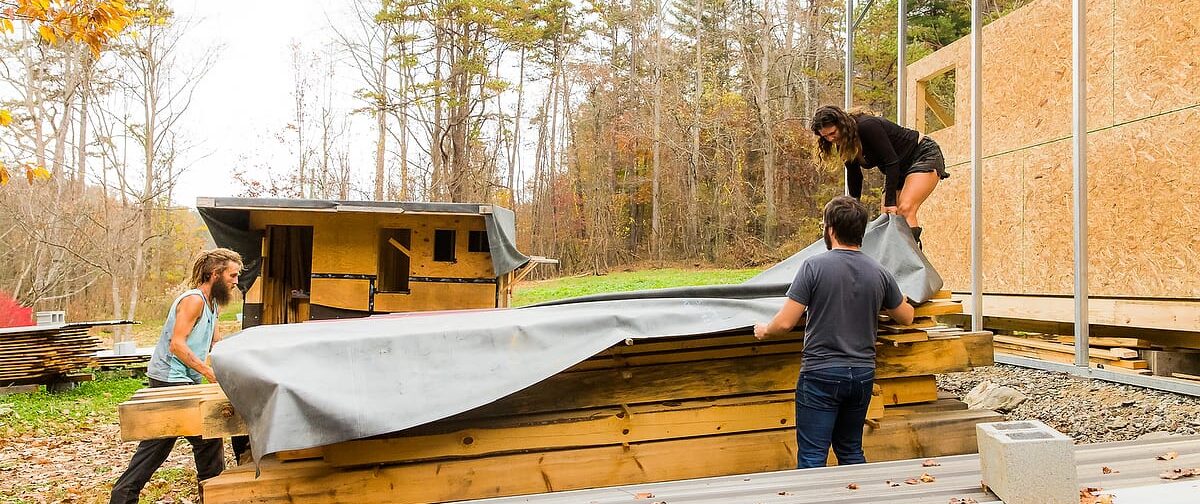
If there is a serious deluge, we will either move to an indoor project or take a rain-day; however, we will gather and work in gentle rain, wind, and hot sun. Before you apply, be sure that you’re up to the physical and mental challenge of working hard outside for two full days each week. If you have physical limitations, please make sure to mention them in the registration form so that we can discuss whether this program will be a good fit for you. If we find that it is not a fit, you’ll be issued a full refund.
Your labor helps make this carpentry program possible
This program is very different from the rest of our building classes; it’s much more focused on getting things done. In our shorter classes (Women’s Basic Carpentry and Adult Beginner Woodworking), the main goal is for the students to learn basic skills, and often the projects we work on don’t end up staying at Wild Abundance.
We’ve created this intensive, longer-term hands-on carpentry program so that a small group of participants can seriously grow their carpentry and building skills through practical application while also contributing their energy to support projects at the school. Lots of clear instruction will be provided through the online Tiny House Building Classes and the In-Person Tiny House Building Workshop, along with specialized guidance for tasks throughout the program.
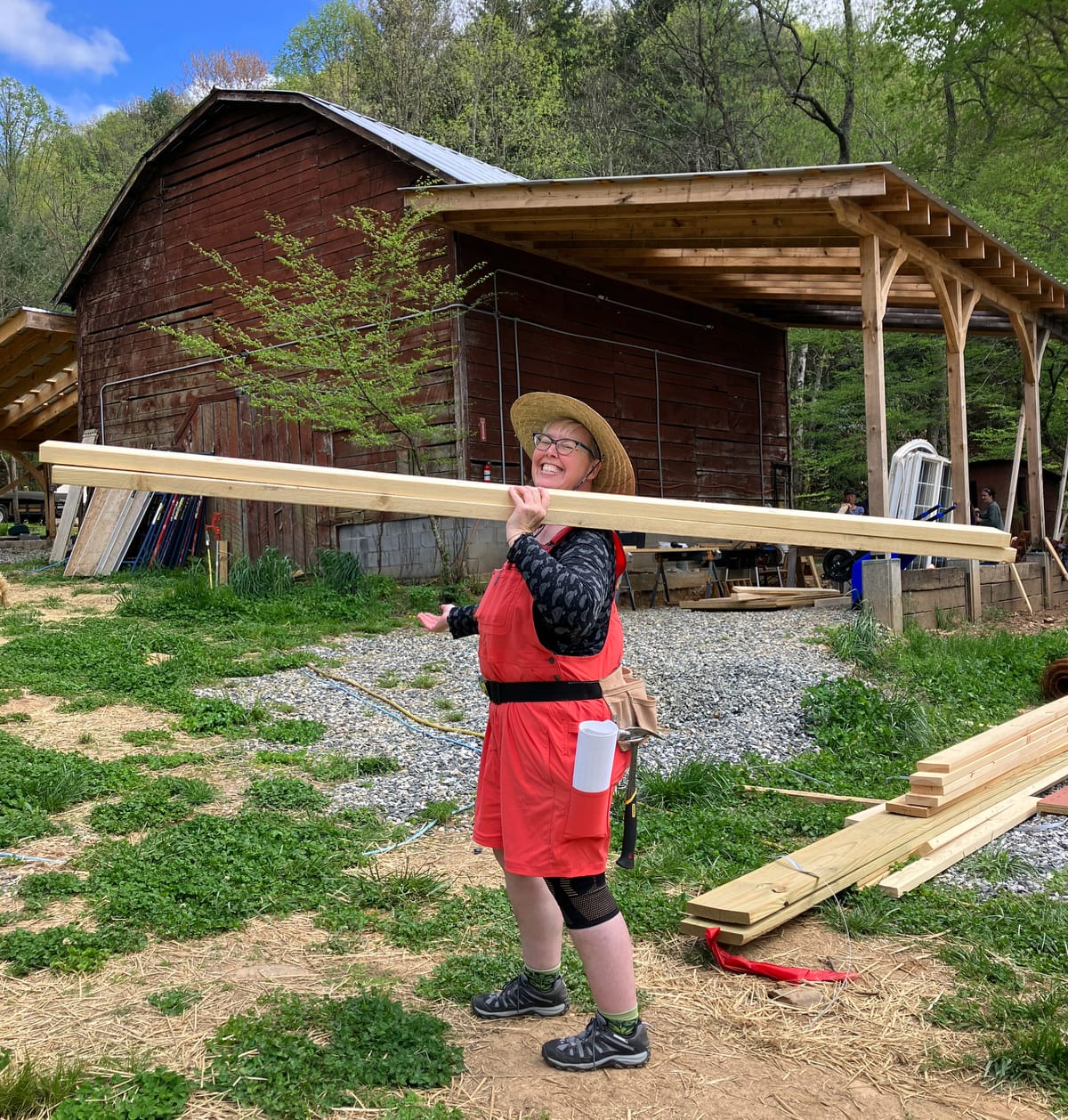
Some of the work will be sequentially on a building, learning a task or technique and then gaining muscle memory by doing it over and over again. Other kinds of work include stacking lumber, digging holes, moving materials, putting a roof on a shed, or doing other things necessary for the school to run smoothly. The cost of this program reflects this balance of instruction time and work time.
With this model, we are offering a much lower teacher to student ratio, and a per-day cost that’s about half that of our other building classes. In order for it to work financially, we rely on participants being truly helpful and getting things done.

Explore conventional and unconventional building.
Most of our buildings are some mixture between creatively earthy and efficiently modern. This is because we like to use the materials that make the most sense for a given project.
For example, if we are building a mobile tiny house, we use conventional lumber because it’s light; when we build an outhouse, we use treated wood where it will make contact with the ground and possibly rot, then locally sourced lumber for the majority of the framing and siding. We like to think ecologically and practically when choosing materials.
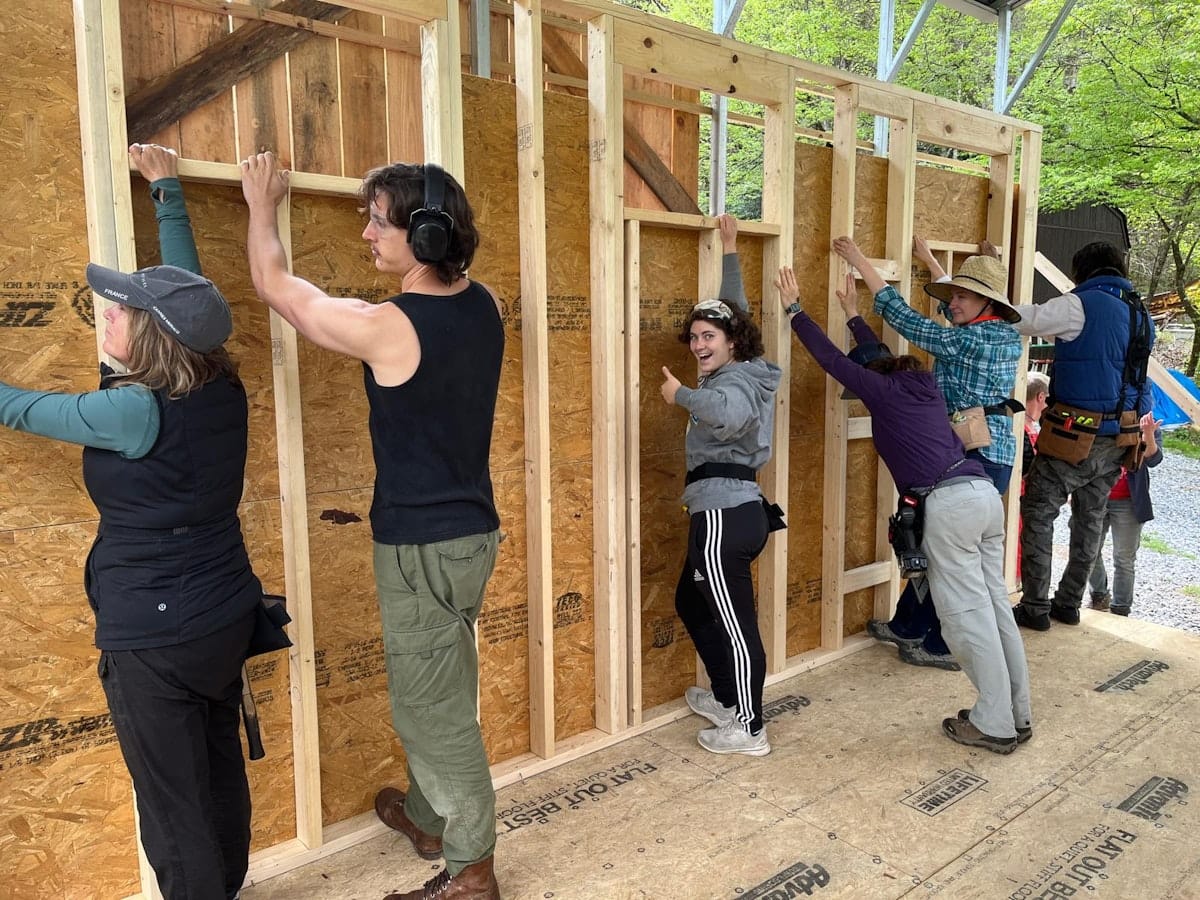
Get the best blend of online and in-person learning in our carpentry training program.
During and leading up to this carpentry training, you’ll be required to complete 2-4 hours of online learning each week.
In order to accomplish this prep work, you’ll get unlimited access to our online Tiny House Academy, where you will find engaging teachers giving lectures and demonstrations on carpentry and tiny house building skills. This program includes all the steps you need to learn how to build a tiny house.
Building is learned best by doing.
Engaging muscle memory is super important in the trades. Indeed, learning the theory of something is very different from getting practice actually doing it. That’s why we give the theory portion of the program in a searchable, online format, and we reserve in-person time for repeated, hands-on experience.
We’ve found that when you actually do a thing, many times, you’ll be much more likely to remember the ins and outs of it, and how to do it well years from now. You will learn the skills in your body and carry them with you after this carpentry training.
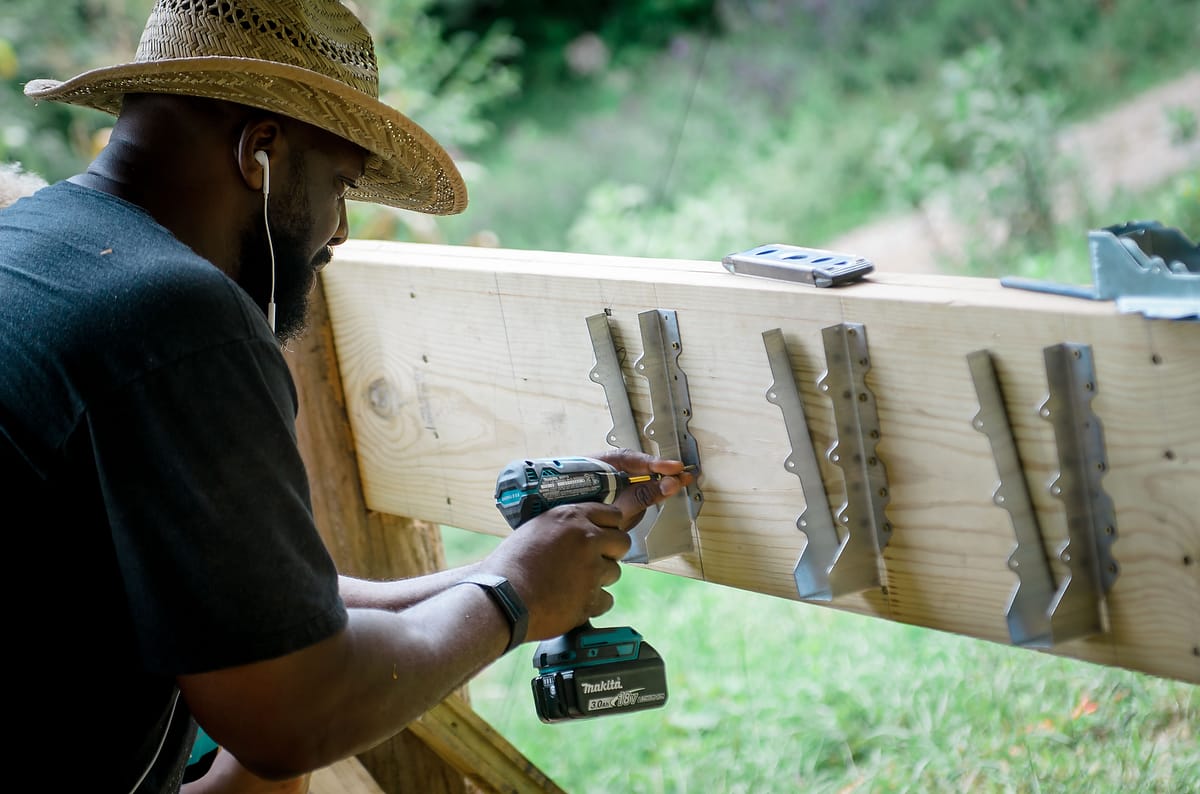
Learn what it takes to build your own home.
One intention for this carpentry program is to give participants an opportunity to learn many of the skills they need to build their own simple, small homes. These skills include designing buildings, digging holes, setting up rebar, pouring concrete, building a floor system, framing and sheathing walls, building a roof system, installing metal roofing, simple electrical, paneling, siding, and more. Making lists of what’s needed to complete jobs, and getting comfortable negotiating trips to the hardware store are also essential skills. Some of these will be learned through work on a single building, and many will be learned piecemeal on different buildings.
Our carpenter programs create new opportunities to enter the world of building.
Throughout our years of teaching women’s carpentry classes, beginner adult woodworking classes, and inclusive tiny house workshops, we’ve seen people from many different backgrounds learn to build for themselves and feel great about it.
All too often, building can feel like a world that isn’t accessible to everyone; we’re here to break down those barriers. Whether you’ve got some experience, or just a strong desire and willingness to work at it, you can learn how to build for yourself.
This hands-on carpentry program is an opportunity to transform that passionate interest into a bevy of real skills that will serve you throughout your life.
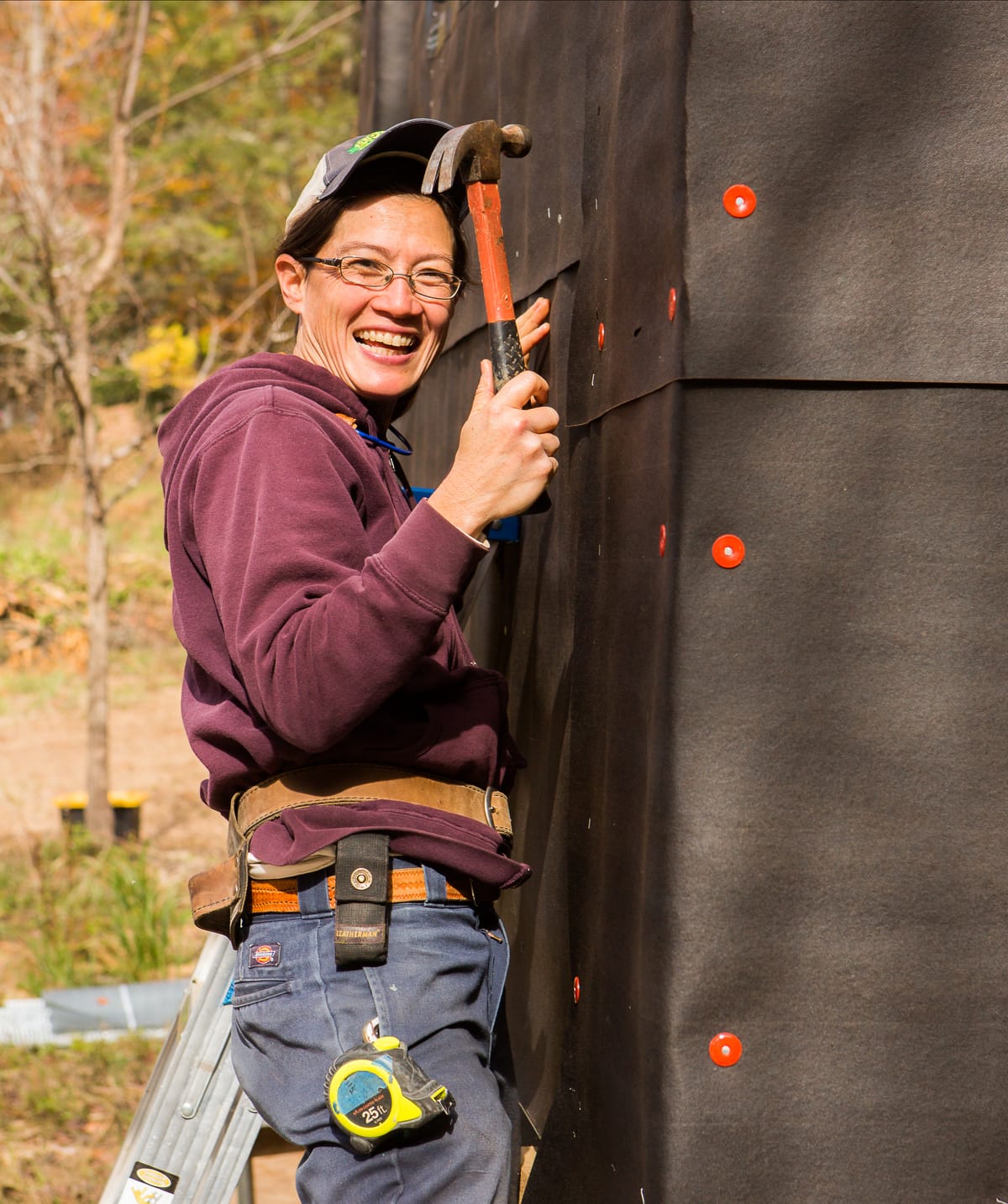
Schedule and Timing of the Carpentry Training Program
We meet each Tuesday and Wednesday from 10:00am-4:00pm with some breaks and flexibility around weather. If you have obligations that prevent you from coming to a few of the class days, don’t worry about it. Most students will miss some days, but we expect you to attend at least six out of the eight program days per month.
In addition to the regular 2-day a week program, you’ll also get to participate in a 10-day tiny house building intensive. Depending on registration for both programs, you may be joining a session of our Tiny House Building Workshop, or participating in a similar intensive with just the other carpentry program participants.
Dates for the spring intensive will be March 31 – April 9. The fall dates will be August 1-10.
Please expect the following:
- Choose from our spring or fall carpentry training dates (see above)
- 2 days/week of mentored hands-on learning by doing
- A 10-day intensive tiny house workshop
- 2-4 hours/week online learning and solo activities
Note the Carpentry Training Program is a non-residential program. If you are coming from out of town, you will need to find accommodations during your class sessions. You are welcome to camp onsite the evenings before and after class sessions.
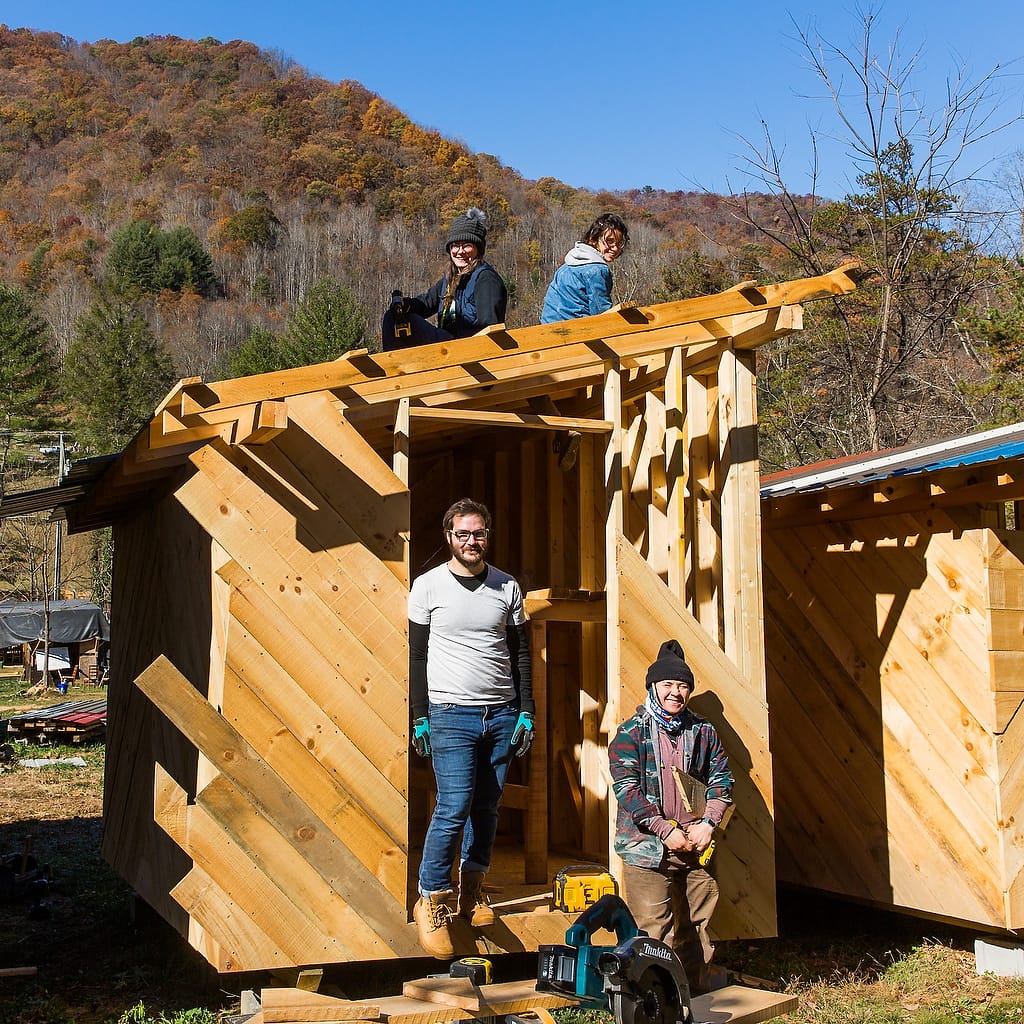
Attend the carpentry training program for four months or eight months.
The standard hands-on carpentry program is four months. If participants are interested in attending an additional four-month section, there is an opportunity for tuition reduction or even a small stipend for the second session attended.
Big commitment and big reward.
The terms of this are determined on an individual basis three months into the first session attended. If you would like to stay on for a full eight months, be sure to communicate this early.
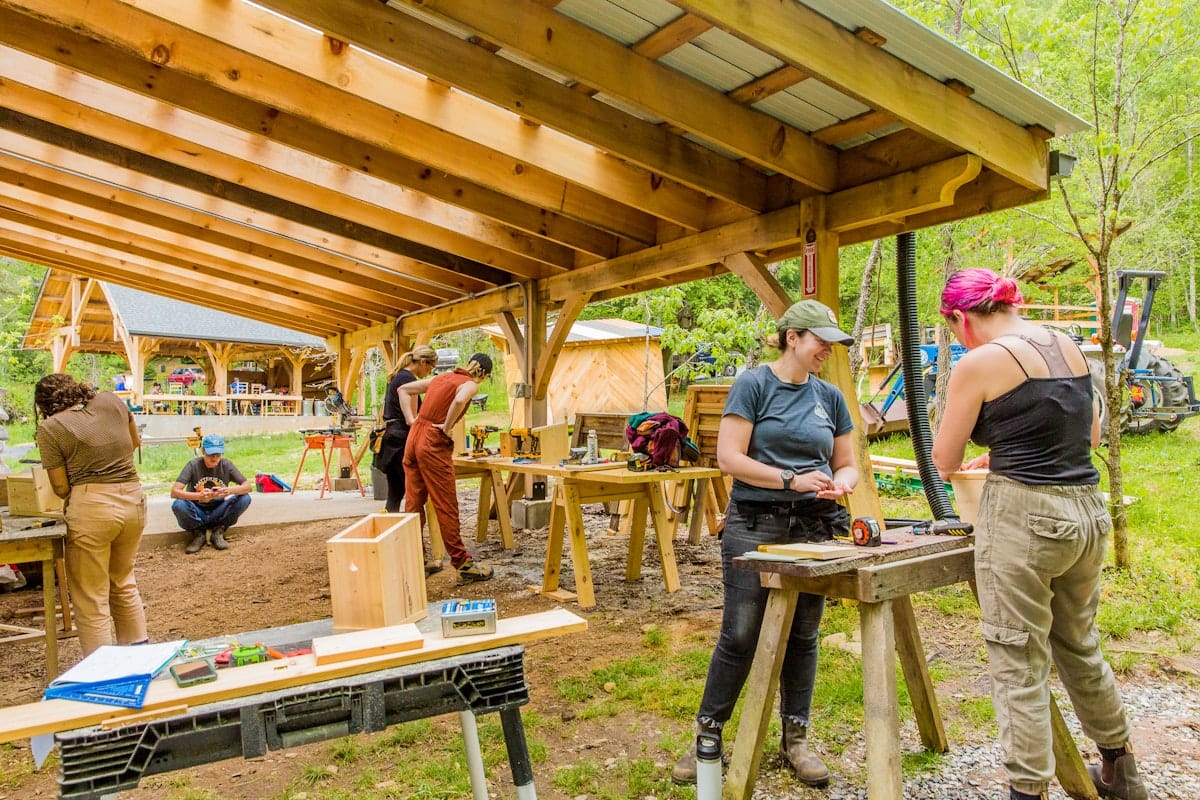
Wild Abundance Building Classes—Assistant Opportunities
One of the best ways to learn deeply is by sharing and teaching. Wild Abundance offers a variety of building classes, including Women’s Basic Carpentry Classes, Adult Beginner Woodworking Courses, Advanced Women’s Carpentry, and our Tiny House Building Workshop.
If participants in the 4 month hands-on carpentry program demonstrate interest and seem up to the challenge, we may invite them to test themselves by assisting as helpers in some of these classes. This can be an amazing opportunity to deepen your learning and to connect with more folks who are enthusiastic about carpentry and building. This doesn’t work for everyone’s schedule or personality, but some participants have found this to be an extremely valuable opportunity.
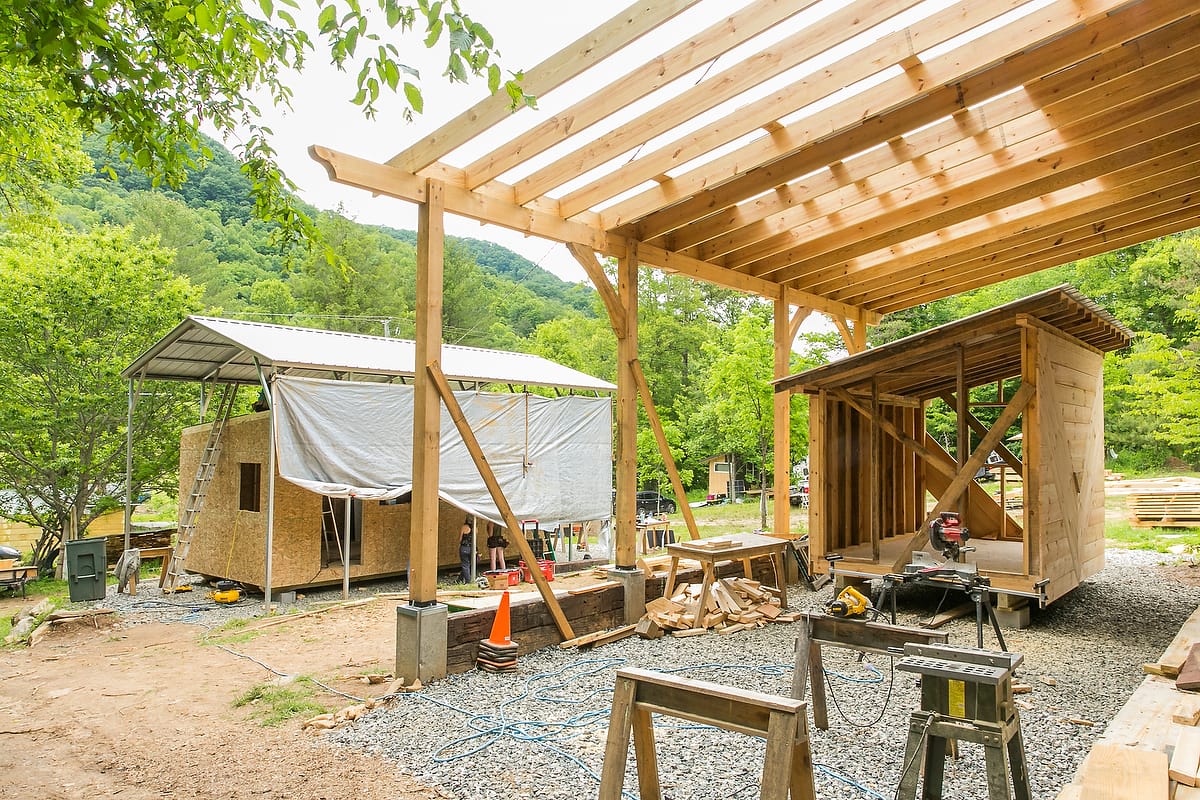
Carpentry Training Program Class Size
We will be welcoming a maximum of eight participants into this program. If you are interested, please get on the waitlist and register as soon as we open up registration, as this program fills very quickly. After you do this, we’ll schedule a 20-minute online interview so we can confirm that the program is a good fit both ways. If it doesn’t seem like a match from the interview, we’ll issue a full refund. If the class is full, standby is a great option, as spots will likely open up.
We welcome folks of all genders and racial identities in this carpentry program! The building trades in the U.S. are often dominated by a small segment of the population; let’s disrupt this trend!
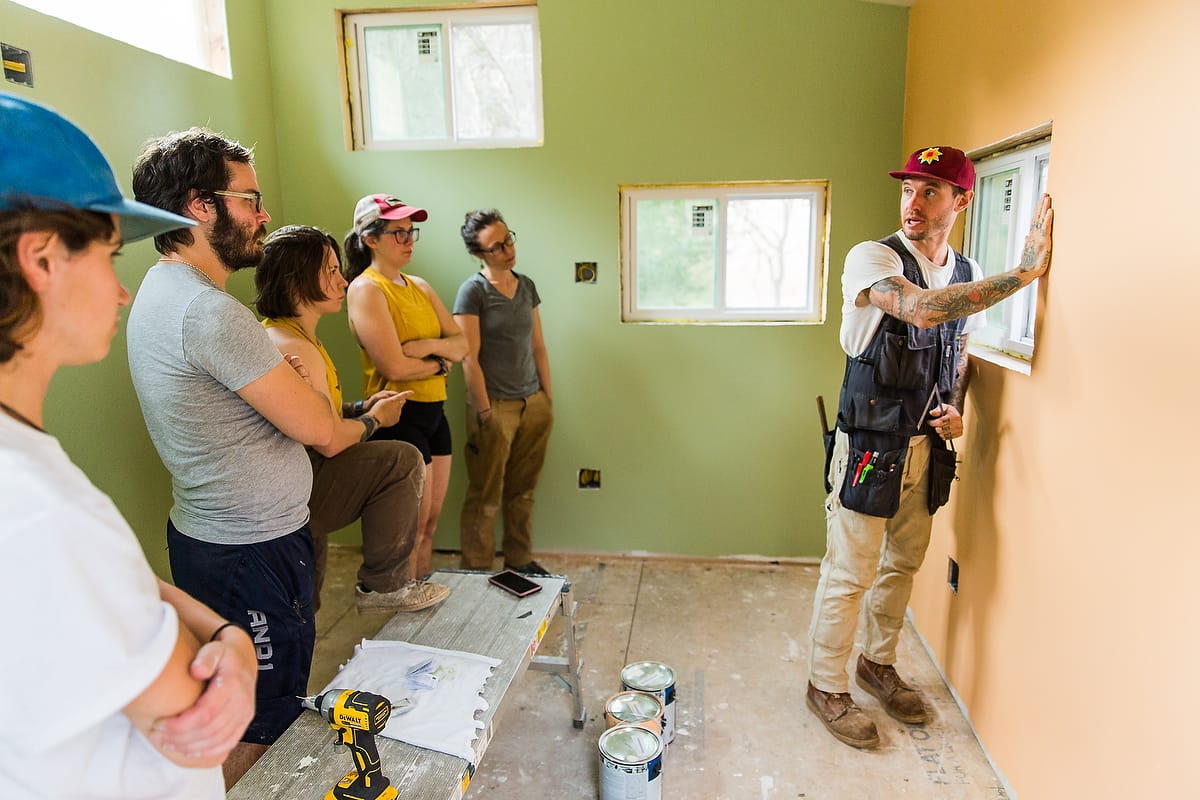
Frequently Asked Questions About the Carpentry Program
The hands-on carpentry program is for you if you’re ready to commit significant time and energy toward learning how to build. During the course of the program, you will level-up your competence and confidence with building. If you apply yourself to the online material and in-person practice, you’ll likely come away with a much deeper understanding of the process of building, including different techniques, what kinds of projects you’d like to do on your own vs. hire out, and much more. We can’t wait to work with you!
Our carpentry training program is a unique immersion into real-life carpentry projects, tiny house building, and homestead maintenance. There may be a carpentry training closer to where you live, but our program is so valuable we have students travel from around the country to join us!
Instructors
Cole Staats
Natalie Bogwalker
Nadi Udros
Keenan Phillips
Pete McKelvey
The 4-Month Carpentry Program is held near Asheville, NC, at the Wild Abundance Paint Fork Campus
Our Paint Fork campus is a bustling creekside landscape with gorgeous mountain views, a breathtaking timber-framed pavilion classroom, and spacious covered open-air wood shops for learning building and carpentry in all weather, plus other lovely features. The Paint Fork campus is 30 minutes north of Asheville.
Please note: our campuses are all unconventional, with rustic amenities and uneven ground. Read more about planning your trip and about our campuses. You’ll receive detailed directions on how to get here upon registration.
You’ve got several options of where to stay during your class. Some students camp, some locals commute, and others choose to rent accommodations with more creature comforts.
Onsite camping (with your own warm bedding and rainproof tent or hammock) is available for free to all students (including locals) during class. Some set-up-for-you tents are available with cots and cozy bedding for a flat fee.
Campers and all students have access to a lovely outdoor kitchen equipped with a stove and hot and cold water, plus pots and pans, knives and cutting boards, bowls, plates, and utensils, along with an outdoor shower with hot and cold running water and an outhouse. If you’d rather rent a hotel, house or cottage, there are many available. We’ll share a curated list of nearby options once you’ve registered.
So you can better plan your trip to come learn with us, here’s some info on accommodations we offer, or that we link to in the student handbook you’ll receive upon registration. Below it you’ll find info on transportation.
- Camping with your own gear: free
- Staying in a large tent with a cozy cot and bedding that we set up for you: $200 flat fee; you can stay there anytime from 5pm before the first day of your class, to 12pm the day after your class ends.
- Hyper-local off-campus single rentals: $40-$2000/night + fees
- Hyper-local off-campus couples rentals: $20-100/person/night + fees
- Hyper-local off-campus group rentals: $25-$86/person/night + fees
Wild Abundance students are given awesome discounts at a local hotel, and a hyper-local inn. More information given in the student handbook upon registration.
Getting a place or renting a car with a group of fellow students and carpooling are great ways to make connections and reduce costs! We share contact info for each class so you can get in touch and make plans together. Everyone has a chance to keep their info private if they choose.
You won’t need a car during your class. There’s a chance you may want to run an errand or go out to dinner with fellow students, and if this happens, it’s highly likely that another student with a car will be happy to give you a lift.
We’ve also got a list of folks who will do airport and grocery shuttle runs for $50-$80 each way. We share this information in the student handbook when you register. If you’d rather rent a car, those run anywhere from $45-$200/day. Just like with lodging, teaming up with a group of fellow students to share a car rental can help build connections and reduce costs.
Pricing for our 4-Month Carpentry Training Program
Regular Pricing: $4,200 – $8,400
*Please pay what you can within this range. The median price helps cover the class costs. Choose the low end if you’re low income, or the maximum fee if your household earns over $115,000/year. Place yourself within this range based on your income.
After you register, we’ll set up a 20 minute Zoom call so we can both see if the program is a good fit for you. If we decide it isn’t, you’ll get a full refund.
